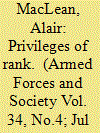| Srl | Item |
| 1 |
ID:
100072


|
|
|
|
|
| Publication |
2010.
|
| Summary/Abstract |
The following article tests the hypothesis that veterans have better health if they were officers when they were in the U.S. military than if they served in the enlisted ranks. It examines this hypothesis by presenting results from logistic regressions that are based on four surveys: the National Survey of Veterans, the Survey of Retired Military, the Panel Study of Income Dynamics, and the Wisconsin Longitudinal Study. In all four of these surveys, the evidence is consistent with the hypothesis that military rank is associated with health, particularly among veterans who served longer. It also suggests that the health gradient by rank is independent of similar gradients by education and income as well as health differences by race. These findings indicate that health may be influenced not just by differences in civilian society but also by those in the military.
|
|
|
|
|
|
|
|
|
|
|
|
|
|
|
|
| 2 |
ID:
082700


|
|
|
|
|
| Publication |
2008.
|
| Summary/Abstract |
This article examines the effects of peacetime cold war military service on the life course according to four potentially overlapping theories that state that military service (1) was a disruption, (2) was a positive turning point, (3) allowed veterans to accumulate advantage, and (4) was an agent of social reproduction. The article argues that the extent to which the effect of military service on veterans' lives corresponds with one or another of the preceding theories depends on historical shifts in three dimensions: conscription, conflict, and benefits. Military service during the peacetime draft era of the late 1950s had a neutral effect on the socioeconomic attainment of enlisted veterans. However, it had a positive effect on veterans who served as officers, which partly stemmed from status reproduction and selection. Yet net of pre-service and educational differences by rank, officers in this peacetime draft era were still able to accumulate advantage
|
|
|
|
|
|
|
|
|
|
|
|
|
|
|
|
| 3 |
ID:
157494


|
|
|
|
|
| Summary/Abstract |
Support for U.S. military personnel appears high, but does it extend to veterans after service ends? This study evaluates public support for social engagement with veterans and spending on recent military veterans’ health care and estimates the extent of socially desirable reporting on these forms of support. It uses a list experiment to identify the extent of socially desirable reporting on topics. Findings demonstrate that the public offers overwhelming support for spending on veterans’ health care and social engagement with the group, but they somewhat overstate this support. Support differs by age, race, and political ideology, and social desirability bias varies by race, political ideology, and prior military experience. African Americans express the lowest levels of support for returning veterans and the greatest extent of socially desirable reporting on that support. This is despite generally high rates of service and greater labor market returns to that service among this demographic group.
|
|
|
|
|
|
|
|
|
|
|
|
|
|
|
|